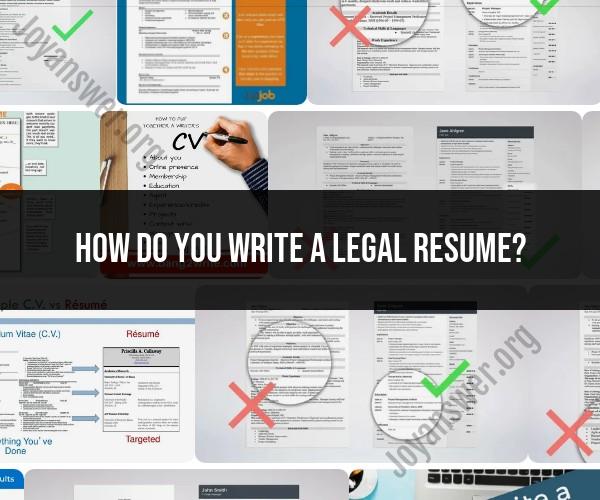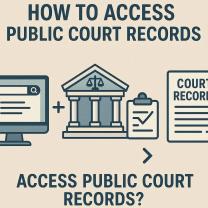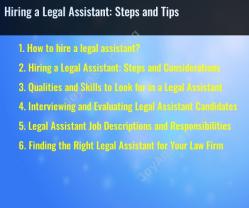How do you write a legal resume?
Writing a winning legal resume is essential for showcasing your qualifications and experiences to potential employers in the legal field. Here are some tips and guidelines to help you craft an effective legal resume:
Choose the Right Format:
- Use a clean and professional format. A chronological or combination (hybrid) resume format is often suitable for legal professionals.
- Include clear headings and use consistent formatting for each section.
Contact Information:
- Include your full name, phone number, email address, and LinkedIn profile (if applicable).
- Omit personal information like your date of birth or marital status.
Objective Statement (Optional):
- Consider including a brief objective statement at the beginning of your resume. State your career goals and highlight what you bring to the table as a legal professional.
Professional Summary (Alternative to Objective):
- Instead of an objective statement, you can include a professional summary section that highlights your key qualifications, skills, and accomplishments.
Education:
- List your educational background in reverse chronological order (most recent degree first).
- Include the name of the institution, degree earned, major, graduation date, and any honors or awards.
- If you have a law degree, mention your Juris Doctor (JD) or equivalent degree.
Bar Admissions:
- If you're an attorney, include a section listing the jurisdictions where you are admitted to practice law. Mention your bar admission dates.
Legal Experience:
- Highlight your legal work experience, including internships, clerkships, and full-time positions.
- Use bullet points to describe your roles and responsibilities.
- Emphasize accomplishments, specific cases, and relevant legal skills.
- Quantify achievements whenever possible (e.g., "Managed a caseload of 50+ clients").
- Focus on experiences that are most relevant to the job you're applying for.
Skills:
- Create a section to list your legal skills, such as legal research, document drafting, litigation, contract negotiation, and any specialized software or tools you are proficient in.
- Mention any foreign languages you are proficient in, especially if they are relevant to the legal field.
Professional Associations:
- Include any memberships in legal or professional organizations, such as the American Bar Association (ABA) or state bar associations.
Publications or Presentations (Optional):
- If you have published articles or delivered presentations related to the legal field, you can include a section highlighting these.
Honors and Awards (Optional):
- Mention any legal-related honors or awards you have received.
References:
- Generally, it's not necessary to include references on your resume. Instead, you can state, "References available upon request."
Proofread and Edit:
- Thoroughly proofread your resume to eliminate typos, grammatical errors, and formatting issues.
- Ensure consistency in verb tense and formatting throughout the document.
Tailor Your Resume:
- Customize your resume for each job application by emphasizing the skills and experiences most relevant to the specific position.
- Use keywords from the job posting to make your resume more likely to pass through applicant tracking systems (ATS).
Length:
- Keep your resume concise and focused. One to two pages is generally sufficient for a legal resume.
Legal Formatting:
- Be mindful of legal formatting conventions, especially if you are applying for positions in law firms. Use standard fonts and avoid overly creative designs.
Seek Feedback:
- Before finalizing your resume, consider getting feedback from peers, mentors, or career advisors in the legal field.
Remember that your legal resume is often the first impression you make on a potential employer, so it's important to present your qualifications and experiences effectively. Tailoring your resume to the specific job you're applying for and highlighting your relevant skills and accomplishments can greatly improve your chances of securing interviews and job offers in the legal field.
Writing a Legal Resume: Tips and Guidelines
When writing a legal resume, it is important to highlight your relevant skills and experience. You should also tailor your resume to the specific legal profession you are interested in.
Here are some tips for writing a legal resume:
- Use a professional format. Your resume should be well-formatted and easy to read. Use a standard font and font size, and make sure your resume is free of errors.
- Start with a strong summary statement. Your summary statement should highlight your skills and experience, and it should state your career goals.
- List your education and training. Be sure to list your law degree and any other relevant education or training. You should also list any awards or honors you have received.
- Highlight your legal skills and experience. Be sure to list your relevant legal skills and experience, including any experience with specific legal areas of practice. You should also list any relevant legal internships or externships.
- Tailor your resume to the specific legal profession you are interested in. Highlight the skills and experience that are most relevant to the specific legal profession you are interested in. You can also tailor your resume by including keywords from the job posting.
Here are some additional tips for writing a legal resume:
- Use strong action verbs. When describing your skills and experience, use strong action verbs to highlight your accomplishments.
- Quantify your results whenever possible. When possible, quantify the results of your work. For example, instead of saying "drafted and reviewed contracts," say "drafted and reviewed over 100 contracts."
- Use keywords throughout your resume. When writing your resume, use keywords throughout the document. This will help your resume get noticed by potential employers who are using applicant tracking systems (ATS).
- Proofread carefully. Before submitting your resume, be sure to proofread it carefully for any errors.
Here are some examples of legal skills and experience that you can highlight on your resume:
- Legal research and writing
- Legal analysis and reasoning
- Client counseling and negotiation
- Courtroom advocacy
- Case management and trial preparation
- Knowledge of specific legal areas of practice, such as corporate law, criminal law, or family law
By following these tips, you can write an effective legal resume that will help you land your dream job.













